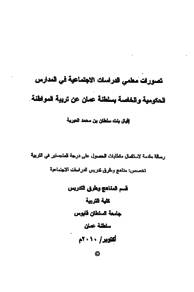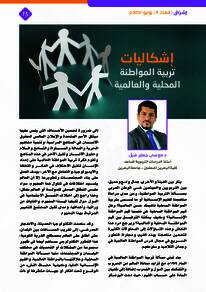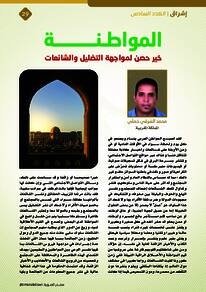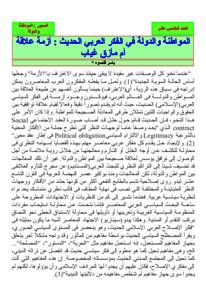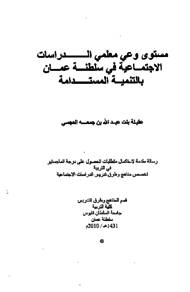Document
تصورات معلمي الدراسات الاجتماعية في المدارس الحكومية و الخاصة بسلطنة عمان عن تربية المواطنة
Publisher
جامعة السلطان قابوس
Gregorian
2010
Language
Arabic
English abstract
This study was aimed to explore the perceptions of Social Studies Teachers' in public and private schools in the Sultanate of Oman about citizenship education. This study specifically attempted to explore their teachers' perceptions with regard to citizenship meanings, the characteristics of a 'good citizen', the approaches of developing citizenship, content of citizenship education, the social studies teacher's role in developing citizenship, and the encountered difficulties in developing citizenship. In addition, the study examined the influence of several variables in teachers' perceptions, namely, gender, specialization, nationality, experience, and type of school. After checked its validity and readability, questionnaires were administered to the sample of study which consists of 257 social studies teachers (grades 5 up to 12). The study came up with a wide range of interesting findings, which can be summarized as follows:
Citizenship has multiple meanings from the perspective of the study sample, It means first "Allegiance to the state", and secondly "Defend the homeland, heritage and culture." Thirdly, it requires "respect the state constitution." A good" citizen" from the standpoint of the participants is first "Respect rules and abiding by the laws", and secondly "Representation of the country in an honorable way abroad." Thirdly, a 'good' citizen is one who "Knows his/her rights and duties." Citizenship can be developed by positive participation in and interaction with different social, religiousnational or international events. Teacher's character and behavior have great influence on strengthen citizenship values in his/her students. From the viewpoints of the participants, social sciences subjects (Islamic culture, Arabic language, English Language, Social Studies) tend to be more associated with developing citizenship values in comparison to applied sciences subjects. The participants view that the content of citizenship education should be given more attention to citizens' rights and responsibilities. Social studies teachers should by employed practical rather than theoretical methods such as "School activities", "Field visits", "Practical activities on local environment", and "cooperating learning" Administrative tasks are the most difficulty in developing citizenship from the viewpoint of the participants. The study found that teachers' perceptions in some domains of questionnaire were influenced be the variables of gender, specialization (Geography or History), teacher's nationality (Omani or Non-Omani), experience (less than 5, more than 5
years), and type of school (public, private). In the light of the above findings, the researcher recommends that more studies nationally and internationally should be conducted in order to better understanding teachers' perceptions about citizenship Education.
Description
رسالة جامعية
Member of
Resource URL
Arabic abstract
هدفت الدراسة الحالية إلى معرفة تصورات معلمي الدراسات الاجتماعية في المدارس الحكومية والخاصة بسلطنة عمان عن تربية المواطنة، وأثر متغيرات الخبرة التدريسية، والجنس، ونوع المدرسة، والتخصص، والجنسية في تصورات أفراد العينة؛ ولتحقيق أهداف الدراسة، أعدت الباحثة استبانة تكونت من (۷۲) عبارة، مقسمة إلى ستة محاور، وبعد التأكد من صدق الأداة وثباتها، تم تطبيقها على عينة الدراسة التي تكونت من (۲۰۷) معلما ومعلمة من المدارس الحكومية والخاصة بمحافظة مسقط، وقد توصلت الدراسة إلى عدة نتائج أهمها:
. تتعدد معاني المواطنة من وجهة نظر أفراد العينة فهي تعني أولا "الولاء للدولة"، وثانية الدفاع عن الوطن وتراثه وثقافتها، وهي ثالثة تتطلب " احترام النظام الأساسي للدولة". و المواطن الصالح من وجهة نظر أفراد العينة هو الذي أولا يحترم النظام ويطبق القوانين"، وثانية " يمثل وطنه بصورة مشرفة في الخارج"، وثالثا " يعرف حقوقه ويؤدي واجباته". و يمكن أن تنمي المواطنة بشكل أفضل من خلال التفاعل الحي؛ سواء المشاركة في الاحتفال بالمناسبات الوطنية والقومية والإسلامية والعالمية؛ كما أن شخصية المعلم وسلوكه لها دور كبير في تجسيد مفهوم المواطنة لدى طلابه. . المواد الإنسانية مثل: الثقافة الإسلامية، واللغة العربية، واللغة الإنجليزية، والدراسات الاجتماعية) أكثر قابلية التنمية المواطنة من المواد العلمية.
• يرى أفراد العينة أن محتوى تربية المواطنة ينبغي أن يعطي اهتماما خاصا لحقوق المواطنين ومسؤولياتهم.
• ينبغي أن يركز دور معلم الدراسات الاجتماعية في تنمية المواطنة على الجوانب التطبيقية والعملية أكثر من الجوانب النظرية؛ إذ تصدرت العبارات التي تتضمن امر الأنشطة المدرسية كالإذاعة والمعسكرات، والزيارات الميدانية، والأنشطة العملية في البيئة المحلية، بما فيها التعلم التعاوني، واللوحات التوضيحية في البيئة الصفية تصورات أفراد العينة . و أهم الصعوبات التي تواجه أفراد العينة في تنمية المواطنة ترتبط بتنظيم العمل
المدرسي وما يرتبط به من إلقاء أعباء إدارية أخرى على كاهل المعلم غير الأعباء التدريسية.
• كشفت الدراسة عن وجود أثر لمتغيرات الجنس (ذكر، أنثي)، والتخصص (تاريخ، جغرافيا)، وجنسية المعلم (عماني، غير عماني) وخبرته التدريسية (من 1 مسنوات، أكثر من خمس سنوات)، ونوع المدرسة التي يدرس فيها (مدرسة حكومية، مدرسة خاصة في تصوراتهم عن بعض محاور الاستبانة المتعلقة بمعنی المواطنة وتربيتها. ولقد قدمت مجموعة من التوصيات والاقتراحات في ضوء نتائج الدراسة من أجل معرفة المزيد عن تصورات المعلمين عن المواطنة وتربيتها، وعن المتغيرات التي يمكن أن تؤثر فيها، والصعوبات التي قد تعترضها والتي تتطلب مزيدا من البحث والدراسة سواء على المستوى المحلي، أو الخليجي، والعربي، والعالمي.
. تتعدد معاني المواطنة من وجهة نظر أفراد العينة فهي تعني أولا "الولاء للدولة"، وثانية الدفاع عن الوطن وتراثه وثقافتها، وهي ثالثة تتطلب " احترام النظام الأساسي للدولة". و المواطن الصالح من وجهة نظر أفراد العينة هو الذي أولا يحترم النظام ويطبق القوانين"، وثانية " يمثل وطنه بصورة مشرفة في الخارج"، وثالثا " يعرف حقوقه ويؤدي واجباته". و يمكن أن تنمي المواطنة بشكل أفضل من خلال التفاعل الحي؛ سواء المشاركة في الاحتفال بالمناسبات الوطنية والقومية والإسلامية والعالمية؛ كما أن شخصية المعلم وسلوكه لها دور كبير في تجسيد مفهوم المواطنة لدى طلابه. . المواد الإنسانية مثل: الثقافة الإسلامية، واللغة العربية، واللغة الإنجليزية، والدراسات الاجتماعية) أكثر قابلية التنمية المواطنة من المواد العلمية.
• يرى أفراد العينة أن محتوى تربية المواطنة ينبغي أن يعطي اهتماما خاصا لحقوق المواطنين ومسؤولياتهم.
• ينبغي أن يركز دور معلم الدراسات الاجتماعية في تنمية المواطنة على الجوانب التطبيقية والعملية أكثر من الجوانب النظرية؛ إذ تصدرت العبارات التي تتضمن امر الأنشطة المدرسية كالإذاعة والمعسكرات، والزيارات الميدانية، والأنشطة العملية في البيئة المحلية، بما فيها التعلم التعاوني، واللوحات التوضيحية في البيئة الصفية تصورات أفراد العينة . و أهم الصعوبات التي تواجه أفراد العينة في تنمية المواطنة ترتبط بتنظيم العمل
المدرسي وما يرتبط به من إلقاء أعباء إدارية أخرى على كاهل المعلم غير الأعباء التدريسية.
• كشفت الدراسة عن وجود أثر لمتغيرات الجنس (ذكر، أنثي)، والتخصص (تاريخ، جغرافيا)، وجنسية المعلم (عماني، غير عماني) وخبرته التدريسية (من 1 مسنوات، أكثر من خمس سنوات)، ونوع المدرسة التي يدرس فيها (مدرسة حكومية، مدرسة خاصة في تصوراتهم عن بعض محاور الاستبانة المتعلقة بمعنی المواطنة وتربيتها. ولقد قدمت مجموعة من التوصيات والاقتراحات في ضوء نتائج الدراسة من أجل معرفة المزيد عن تصورات المعلمين عن المواطنة وتربيتها، وعن المتغيرات التي يمكن أن تؤثر فيها، والصعوبات التي قد تعترضها والتي تتطلب مزيدا من البحث والدراسة سواء على المستوى المحلي، أو الخليجي، والعربي، والعالمي.
Category
Theses and Dissertations

